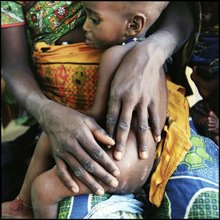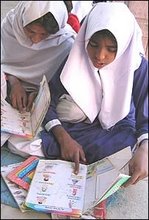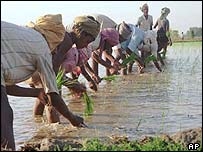PREAMBLE: This is our 6th annual review of topics covered over the preceding year. Our 2011 review was presented in January this year (an aberration due to a scheduling conflict), but this time we return to our usual practice and close the year with our review.
As is our custom, we lead with praise (“flowers”) and criticism (“fertilizer”) in 3 categories: global stewardship, international development, and human rights. A synopsis of monthly blog themes follows.
1. Global Stewardship
For 2012, flowers for leadership go to the Gates Foundation, and the government of Japan, both of which demonstrated great integrity with their support for the Global Fund for AIDS, Tuberculosis and Malaria (GFATM), at a time when several European countries hid behind sanctimony and hypocrisy while withholding their funding (next para).
The fertilizer award goes emphatically to Germany, Ireland, and Sweden and the European Commission for suspending funding to the Global Fund (GFATM). In part, this decision was made ostensibly due to corruption in recipient countries, even though this was limited to only 4 countries (among over a hundred recipients) and was discovered, investigated and openly reported by the Global Fund itself. This level of corruption, independently analysed, is significantly lower than that of the EURO block. The truth behind this decision is that Europe itself has been financially mismanaged, with bank failures, corruption and mismanagement.
The decisions of these European entities smack of old style colonialism: arrogance from the top down. It damages their hard won (or restored) reputations for being global leaders. To use developing countries and the Global Fund as a scapegoat for this is unconscionable. Instead, these particular European entities should have had the intestinal fortitude to own up and say “sorry, we can’t afford this now, because we ourselves are in such a mess”.
Corollary: With this backdrop, it is amazing that Europe still “won” the 2012 Nobel Peace Prize
2. International Development
Flowers for this category go to many Developing Countries collectively for the real progress in addressing the long-standing lack of potable drinking water, as documented by WHO and UNICEF, and in line with one of the major planks of the Millennium Development Goals (MDGs).
The fertilizer award in this category goes to China. In November, China's 18th Communist Party conference underwent a power shift to a new generation of leaders in a tightly orchestrated process, characterized by opacity and lack of public participation, and with virtually no representation of women in the governing structure, carefully scripted although all this was for domestic and international optics. If China wants to be viewed as a leader in international development, it has to do much better than this in its own internal development
3. Human Rights
We offer flowers to countries now engaging in Truth and Reconciliation processes, whether this be for the indigenous people of Canada, the stolen generations of Australia, and the export of (allegedly) parentless children by the UK following the second world war (yet to be fully acknowledged by the British government). There are many more examples than this, in many countries and cultures, a historical legacy that moves forward with us all until properly confronted to address past wrongs and grievances, and to achieve a meaningful resolution.
the other end of the spectrum, we can only confer a deposit of rather smelly fertilizer to Canada (Harper government), for reducing refugee access to routine medical care: reduction of ‘basic’ coverage, including primary and preventive care, and ‘supplemental’ coverage similar to that available to many low-income Canadians. This is both short-sighted and wrong-headed.
January (2012): "2011 AS WE RECORDED IT..." if you would also like to revisit the prior year, here is a direct link: http://pacificsci.blogspot.ca/2012/01/international-global-development-year.html
February: MAJOR PROGRESS IN MALARIA CONTROL: THE ROLE OF THE GLOBAL FUND, ITS DETRACTORS AND SUPPORTERS.
This issue was dedicated to major successes taking place in malaria control, largely due to support from the Global Fund, despite decisions by several European entities (Germany, Ireland, and Sweden and the European Commission itself) to suspend funding to the Global Fund on AIDS, Tuberculosis and Malaria (GFATM). See Global Stewardship (above) for further discussion. Thankfully, the Bill and Melinda Gates Foundation, being evidence-based, stepped in to shore up Global Fund finances due to this donor default. Also, former Japanese prime minister Naoto Kan said his country would contribute $340 million to the fund this year. Two years ago, Japan contributed $200 million, but it gave only $110 million last year because of domestic needs from the earthquake and tsunami. Of course many other countries are honoring their pledges, even as many of them also have financial challenges at this time.
March: GLOBAL DRINKING WATER GOAL MET FIVE YEARS AHEAD OF SCHEDULE
This issue gave visibility to real progress in addressing the long-standing lack of potable drinking water in many developing countries. Our source is a new report from WHO and UNICEF entitled Progress on Drinking Water and Sanitation 2012 Update. Despite real progress, challenges remain for some regions, particularly sub-Saharan Africa, especially in rural settings where the burden of poor water supply falls most heavily on girls and women. Equivalent progress also is not being made with regard to sanitation.
At the other end of the spectrum it is important to take note of recognition by the UN General Assembly of “water and sanitation as a human right". Unfortunately, there were abstentions, notably including Canada (Harper government again!). This abstention is curious, given that Canada’s indigenous people suffer disproportionately from poor water and sanitation.
April: APOLOGIES FOR PAST WRONGS AND GRIEVANCES
Here we addressed at a conceptual level the many contemporary political debates concerning recent and past conflicts. These demonstrate that perceptions matter in today’s politics, and that conflicts do not necessarily resolve by ending a war or signing a treaty. Negotiating an agreement can send a positive signal to the parties involved that they are willing to end the injustices and violence, but the emotional issues created can set the stage for resumption of hostilities even after a negotiated settlement is reached. Thus, in order for a conflict to be truly resolved there needs to be a lengthy process of reconciliation aimed at eradicating the emotional barriers between those involved and resuming trust between the victims and perpetrators. In this blog we offered an overview of underlying issues, mostly from a generic standpoint, keeping in mind that there are numerous conflicts of this nature around the world.
May: PUBLIC HEALTH IN THE MIDDLE EAST Reconnaissance of Issues and Developments
Over the past decade, this region has been dealing with social and political unrest, much of this of an extreme nature, largely resulting from a lack of good governance combined with negative geopolitical dynamics that have given scant regard to the wellbeing of the general populace. Countries in the region face many common challenges: social and economic development, status of women, environmental control and regulation, a highly mobile migrant workforce and other demands of a globalized economy.
This reconnaissance contained two sections: first, the published perspectives of the World Bank and WHO/EMRO, and second, observations on the emergence of two networks: public health associations, and membership of national public health institutes in a new global organization. It focused on the value of “healthy public policy”, the main aim of which is to create supportive environments to enable people to lead healthy lives, to make health choices possible or easier for citizens. In the pursuit of healthy public policy, government sectors concerned with agriculture, trade, education, industry, and communications need to take into account health when formulating policy, so as to benefit populations, communities and individuals.
June: CANADA RENEGES ON REFUGEE HEALTH
Canada’s federal government announced cuts to health services for refugees, to come into effect on June 30, 2012. These include reduced ‘basic’ coverage: primary and preventive care, and ‘supplemental’ coverage similar to that available to many low-income Canadians.
These changes are extremely short-sighted: diverting care for people in greatest need to urgent care settings, and may even give rise to public health threats such as tuberculosis especially if diagnosis is delayed or the condition left untreated. To deny health care to refugees is to inappropriately burden both Canada’s health system and the health of Canadians. This is both socially unjust and contradicts the principles of the Canada Health Act.
PacificSci thus joined with all organizations calling for the Federal government to rescind these proposed changes before they are implemented. The refugee health program should continue to provide basic benefits similar to provincial/territorial health care plans and supplemental benefits similar to what provinces and territories provide under social welfare.
July: MILLENNIUM DEVELOPMENT GOALS - 2012 REPORT HIGHLIGHTS
The MDG Report 2012 was launched in New York by UN Secretary-General Ban Ki-moon on July 2, 2012. Several MDG targets have been met well ahead of the 2015 target date. The report states that meeting remaining targets remains possible if Governments keep their commitments made over a decade ago.
Highlights: Extreme poverty is falling in every region including Sub- Saharan Africa. The world has met the target of halving the proportion of people without access to improved sources of water. Improvements in the lives of 200 million slum dwellers exceeded the slum target. The world has achieved parity in primary education between girls and boys. Many countries facing the greatest challenges have made significant progress towards universal primary education. Child survival progress is gaining momentum. Access to treatment for people living with HIV increased in all regions. The world is on track to achieve the target of halting and beginning to reverse the spread of tuberculosis. Global malaria deaths have declined.
These accomplishments notwithstanding, there remain major challenges:
Achievements are unequally distributed across and within regions and countries; progress has slowed for some MDGs after the 2008-9 economic crisis and related consequences; vulnerable employment has decreased only marginally over twenty years; decreases in maternal mortality are far from the 2015 target; use of improved sources of water remains lower in rural areas; hunger remains a global challenge; the number of people living in slums continues to grow; gender equality and women’s empowerment remain key challenges.
August: NEW GLOBAL JOURNAL OF MEDICINE AND PUBLIC HEALTH LAUNCHED
Illustrating a positive trend in research capacity development in developing countries, the Global Journal of Medicine and Public Health was launched early in 2012, honouring the principle that medical and public health practices must be appropriate to settings where they are applied.
An Inaugural Editorial is accessible at : http://www.gjmedph.org/uploads/EDITORIAL-Vo1No1.pdf
Readers may also visit the CURRENT ISSUE of the journal at: http://www.gjmedph.org/Current.aspxv
September: FACT CHECK: REPUBLICAN PARTY STATEMENTS ON HEALTH CARE REFORM
Normally we would not presume to comment on an election issue in the United States. However, this principle is based on the assumption that Americans will place their vote based on accurate information regarding the candidates and the issues important to them. It is for this reason that, in this issue of Global Perspectives, we made an exception. We are providing this “fact check” because Republican Vice-Presidential candidate Paul Ryan, in his apparent zeal to prevent the successful emergence of universal health care coverage in the United States (the Patient Protection and Affordable Care Act of 2010), was making negative references to the comparative performance of universal health care in Canada: these statements by Ryan were demonstrably misleading.
The health care system performance of six developed nations on several key parameters, was recently (2008) ranked by the Commonwealth Fund, a respected American foundation that promotes better access, improved quality, and greater efficiency, particularly for society's most vulnerable, including low-income people, the uninsured, minority Americans, young children, and elderly adults. The countries included in this exercise were: Australia, Canada, Germany, New Zealand, the United Kingdom, and the United States.
Notably the United States ranked 6th (last place) overall, and 6th in 5 out of 9 specific parameters; these include: safe care, access, efficiency, equity (fairness), healthy lives, and health expenditure per capita. Of the remaining parameters, it ranked 5th each for quality of care, coordinated care, and patient centred care. Its only first place ranking was for right care.
Contrasts with Canada are indeed relevant. A systematic review of 38 studies reveals that Canada’s system achieves more favorable outcomes when compared with the U.S. predominantly private for-profit system, at less than 50% of the cost.
October: ADDRESSING SOCIAL INEQUITIES:............ Fact Sheets - 10 PROMISING PRACTICES
As part of a 2009 Canadian Health Services Research Foundation Fellowship, the Sudbury & District Health Unit (which is located in Northern Ontario, Canada) identified 10 practices that are promising in their potential to reduce social inequities in health in our communities.
The fact sheets are designed to help public health practitioners and community partners apply each of the 10 Promising Practices to reduce social inequities in health. They have a common format that identifies essential components, key issues, and tools and resources for each Promising Practice.
The 10 Promising Practices Fact Sheets
1.Targeting With Universalism - http://bit.ly/OXBqsq
2.Purposeful Reporting - http://bit.ly/OSPYMm
3. Social Marketing - http://bit.ly/O6Pf8T
4. Health Equity Target Setting - http://bit.ly/Ml0s7m
5. Equity-Focused Health Impact Assessment - http://bit.ly/ONRCfq
6. Competencies/Organizational Standards - http://bit.ly/PHgx2Q
7. Contribution to the Evidence Base - http://bit.ly/P7KpuM
8. Early Childhood Development - http://bit.ly/Nq1Xgz
9. Community Engagement - http://bit.ly/NgalCF
10. Intersectoral Action - http://bit.ly/MBQPwB
November: SUPERPOWERS AT THE CROSSROADS What lies ahead for the United States and China (and others)
The lead-up to the US presidential election filled the airwaves for months, with constant analysis and forecasting, until Barack Obama’s re-election victory over Republican Mitt Romney was secured on November 9th with a large and impressively pluralistic margin in the popular vote and a very large margin in electoral college votes.
That same week, on November 8th, China's 18th Communist Party conference began a power shift to a new generation of leaders in a much more formal and tightly controlled process.
Observing these two approaches to transition in national political leadership has been a study in contrasts: the high visibility and overall transparency of the US election, despite its many apparent flaws, in stark contrast to the opacity and lack of participation inherent in the Chinese process, carefully scripted as it was for domestic and international optics.
December: INTERNATIONAL & GLOBAL DEVELOPMENT – YEAR IN REVIEW 2012… This Issue!
AND A HAPPY NEW YEAR!
We extend to readers our best wishes for 2013, with hopes that the global challenges of recent years will be better understood and more humanely managed going forward. PacificSci will continue to offer an independent view.
FROM a Great Canadian and World Statesman
"A great gulf... has... opened between man's material advance and his social and moral progress, a gulf in which he may one day be lost if it is not closed or narrowed..."
Lester B Pearson
http://nobelprize.org/nobel_prizes/peace/laureates/1957/pearson-lecture.html
INSPIRATIONAL WELCOME ............................... from T.S.Eliot's "Little Gidding"
If you came this way From the place you would come from... It would be the same at the end of the journey...
If you came, not knowing what you came for, It would be the same... And what you thought you came for Is only a shell, a husk of meaning... From which the purpose breaks only when it is fulfilled If at all.


























